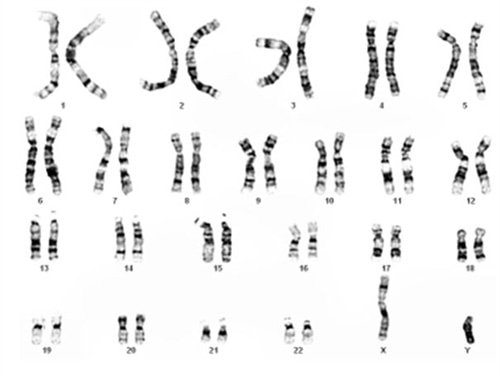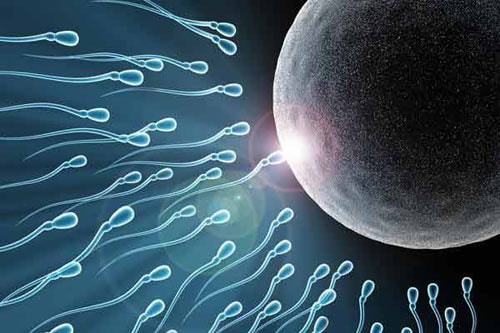3 genetic causes of infertility in men
In addition to causes such as undescended testicles, infections, testicular torsion, etc., male infertility is also caused by genetic factors and experts recommend testing, thereby increasing the chances of pregnancy in infertile couples.
Chromosomal abnormalities
 |
| Chromosomal testing should be performed in couples with fertility abnormalities. |
Maternal abnormalities are caused by many factors such as endocrine, anatomical abnormalities, infections,... especially genetic factors that require diagnosis, prognosis and genetic counseling.
With the report content: "Studying some chromosomal abnormalities in couples with pregnancy abnormalities", Associate Professor, Dr. Hoang Thi Ngoc Lan - Deputy Director of the Center for Prenatal Diagnosis, Central Obstetrics Hospital said:
Couples with chromosomal abnormalities have a high rate of miscarriage and stillbirth, so karyotype testing is a test that should be widely considered. Research results on 715 couples with miscarriage and stillbirth showed that 37 couples had chromosomal abnormalities (5%), including 1 pair with numerical abnormalities (XYY) and 36 pairs with structural abnormalities of chromosomes.
Associate Professor, Dr. Hoang Thi Ngoc Lan recommends: in addition to excluding anatomical causes, routine and widespread chromosome testing should be prescribed for couples with obstetric abnormalities such as miscarriage, stillbirth, especially those with 2 or more miscarriages.
At the same time, manage and closely monitor the pregnancies of couples with chromosomal abnormalities, perform prenatal screening for timely consultation, as well as advise them whether to have children or not. When there are abnormalities, patients undergo appropriate assisted reproductive techniques, because the child will be born with abnormalities and deformities, so when there are abnormal chromosome results, it is necessary to ask for eggs or sperm from others.
Deletion of a gene segment on the Y sex chromosome
 |
| Image of SRY gene transfer to X chromosome. |
Dr. Nguyen Khac Han Hoan - Department of Medical Genetics, Tu Du Hospital said: about 50% of infertile couples have male causes, of which genetic and chromosomal causes account for 10-15%. Male infertility due to Y chromosome abnormalities causes spermatocytes to develop abnormally, reduces or does not produce sperm,...
Genetic abnormalities cause sperm production disorders. Dr. Hoan cited the case of a patient with 46,XX but was male. Due to the transfer of the SRY gene segment to the X chromosome, the sex-determining region on the Y chromosome, this patient developed abnormal testicular development and abnormal gender development.
Therefore, Dr. Nguyen Khac Han Hoan gives cases that require AZF testing such as no or little sperm in semen, before surgery to treat varicocele, brother or biological brother has a history of detecting abnormal AZF segment.
Sperm DNA fragmentation
 |
| Sperm DNA fragmentation reduces the ability to fertilize. |
In addition to the potential genetic infertility factor in the male body, according to Associate Professor, Dr. Phan Thi Hoan, Department of Biomedical Biology - Genetics, Hanoi Medical University, the cause of male infertility is due to environmental factors.
At the conference, Associate Professor Hoan said: about 10% of infertile men have normal semen test results. So what is the cause of male infertility? Researchers show that the cause of infertility is due to broken sperm DNA.
Causes of sperm DNA breakage include: causes in the male reproductive system (gonadal infections, sperm staying in the epididymis and vas deferens for a long time, etc.), environmental factors, lifestyle (tobacco, environment and radiation), systemic diseases (diabetes, cancer, systemic infections). Sperm DNA breakage reduces the ability to fertilize, reduces embryo quality, thereby reducing the effectiveness of infertility treatment.
Currently, the Halosperm test is used to assess the degree of breakage and thereby predict the prognosis for assisted reproductive methods. When the DFI index (sperm DNA breakage index) is > 30%, if the embryo is allowed to develop, the risk of miscarriage, stillbirth, birth defects ... is very high. At the same time, when the DFI index is > 30%, the success rate of artificial insemination, IUI, IVF ... is very low. The patient's only chance is in vitro fertilization by injecting sperm directly into the egg to create an embryo (ICSI).
In particular, the results of a study on 300 infertile male patients, aged 18 and over with normal semen analysis, showed that the number of men with DFI > 30% accounted for a fairly high rate of 41%. Associate Professor Hoan recommended that the Halosperm test should be popularized and applied in finding the cause of infertility in men with normal and abnormal semen analysis.
According to VNN
| RELATED NEWS |
|---|

